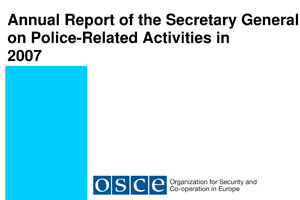Annual Report of the Secretary General on Police-Related Activities in 2007
Description
This report provides information about police-related activities of the SPMU and other cross-dimentional police-related activities of other thematic units in the Secretariat. It also gives an overview of the capacity and institution building activities undertaken by the OSCE field operations in support of their respective host-State governments.
Summary
Throughout 2007, the SPMU continued promoting the objectives of democratic police services and forces in the participating States, focusing on: the importance of the police’s commitment to the rule of law, policing ethics, and human rights standards; the essential nature of police accountability to the law and to the society the police serve; as well as the need for police co-operation with the communities, recognizing that effective policing requires partnership with the communities being served.
The SPMU’s efforts in developing baseline police capacities of participating States and its support to policy development was underpinned by the development of two new key publications: Good Practices in Building Police-Public Partnerships and Good Practices in Basic Police Training – Curricula Aspects; and by the distribution of English and Russian versions of the Guidebook on Democratic Policing and the Reference Guide to Criminal
Procedure to the OSCE field operations.
SPMU training projects focused on combating illegal drugs and investigating Trafficking in Human Beings and on assisting field operations in conducting their own training projects.
The SPMU was also very active in dealing with organised crime issues, organising and participating in a number or organised crime cluster meetings within the OSCE and in a number of workshops in co-operation with UNODC and other international partner organisations.
Co-operation with other internal and external partner organisations was also high on the Unit’s agenda with respect to other fields of policing. Utilizing its Policing Online Information System, the SPMU also continued serving as a main collection point and central repository for OSCE police-related institutional knowledge, providing the platform for sharing information resulting from OSCE activities, from local initiatives and from development work of other international organisations and agencies.
[...]
In 2007, The Action against Terrorism Unit continued supporting and promoting national and international legal frameworks for the fight against terrorism and organised crime through a series of sub-regional and national workshops in co-operation with the UNODC.
The Borders Team in the Conflict Prevention Centre continued to actively participate in the Ohrid Border Process to bring national border legislation, organisation and institutions of the countries of South-Eastern Europe in line with the EU Integrated Border Management Guidelines. In South-Eastern Europe, the Unit also provided support to cross-border cooperation meetings at the operational level.
[...]
In 2007, police-related activities of the field operations have further increased mainly due to a number of new initiatives in the Southern Caucasus and Central Asia. While the Missions in South-Eastern Europe continued to downsize their police components (the Mission to Croatia closed its police component at the end of 2006), the field presences in the Southern Caucasus and Central Asia slightly enlarged their staff of police practitioners. The topics, which continued to dominate OSCE’s policing agenda in 2007, were transnational crime and terrorism, police accountability and the need of the people to be served by knowledgeable and responsive police agencies. OSCE police reform assistance programmes thus continued to focus mainly on developing and conducting basic and advanced police training; establishing internal oversight mechanisms and institutions; promoting human rights, particularly in the context of investigations, detentions and public order management; implementing community policing; and enhancing cross-border police co-operation, particularly in the fight against trafficking in human beings and drug trafficking.
